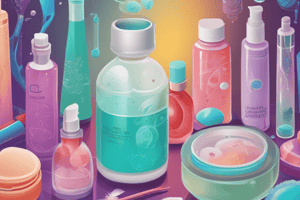Podcast
Questions and Answers
Which type of silicone is known for providing a smooth, non-greasy feel?
Which type of silicone is known for providing a smooth, non-greasy feel?
- Amodimethicones
- Cyclomethicones
- Trimethicones (correct)
- Dimethicones
What is one of the primary skin benefits of using silicones?
What is one of the primary skin benefits of using silicones?
- Enhances skin oiliness
- Increases skin pigmentation
- Soothe and calm irritated skin (correct)
- Causes skin dryness
Which regulatory entity recognizes silicones as generally safe?
Which regulatory entity recognizes silicones as generally safe?
- Environmental Protection Agency (EPA)
- U.S. Food and Drug Administration (FDA) (correct)
- European Medicines Agency (EMA)
- World Health Organization (WHO)
What is a key benefit of amodimethicones in hair care?
What is a key benefit of amodimethicones in hair care?
Which of the following is NOT an alternative to silicones?
Which of the following is NOT an alternative to silicones?
How do cyclomethicones behave when applied to the skin?
How do cyclomethicones behave when applied to the skin?
What is a benefit that silicones offer to hair in terms of styling?
What is a benefit that silicones offer to hair in terms of styling?
In some countries, what might happen to certain silicones due to environmental concerns?
In some countries, what might happen to certain silicones due to environmental concerns?
What role do natural oils, like coconut oil, play as alternatives to silicones?
What role do natural oils, like coconut oil, play as alternatives to silicones?
Which benefit is associated with using silicones on the skin?
Which benefit is associated with using silicones on the skin?
Flashcards are hidden until you start studying
Study Notes
Types Of Silicones
- Dimethicones: Thickeners and emollients that provide a barrier on the skin's surface
- Cyclomethicones: Volatile silicones that evaporate quickly, leaving no residue
- Amodimethicones: Conditioners that help to detangle and add shine to hair
- Trimethicones: Lightweight emollients that provide a smooth, non-greasy feel
- Phenyl Trimethicones: Add shine and softness to hair, while also providing antioxidant benefits
Skin Benefits
- Moisturizing and hydrating properties
- Improve skin elasticity and firmness
- Reduce appearance of fine lines and wrinkles
- Protect skin from environmental stressors and pollution
- Soothe and calm irritated skin
Regulatory Status
- Generally recognized as safe (GRAS) by the FDA in the United States
- Compliant with EU Cosmetics Regulation (EC) No 1223/2009
- Some silicones may be restricted or banned in certain countries due to environmental concerns
Hair Care Applications
- Conditioning agents to detangle and add shine
- Leave-on products to provide long-lasting hydration and smoothness
- Styling products to add hold and texture
- Protect hair from heat damage and breakage
- Enhance color vibrancy and longevity
Alternatives To Silicones
- Natural oils (coconut, argan, jojoba) for moisturizing and hydration
- Plant-derived emollients (glycerin, ceramides) for skin and hair benefits
- Natural waxes (beeswax, carnauba) for texture and hold
- Antioxidant-rich ingredients (vitamin E, green tea) for environmental protection
- Emollients derived from natural sources (olive oil, shea butter) for skin and hair nourishment
Types Of Silicones
- Dimethicones: Function as thickeners and emollients; create a skin barrier.
- Cyclomethicones: Quick-evaporating volatile silicones; leave no residue behind.
- Amodimethicones: Act as conditioners for hair; facilitate detangling and enhance shine.
- Trimethicones: Lightweight emollients; deliver a smooth, non-greasy sensation.
- Phenyl Trimethicones: Improve hair shine and softness; provide antioxidant protection.
Skin Benefits
- Offer significant moisturizing and hydrating effects.
- Enhance skin elasticity and firmness over time.
- Help diminish the visibility of fine lines and wrinkles.
- Shield skin from environmental pollutants and stressors.
- Have soothing properties to calm and alleviate irritated skin.
Regulatory Status
- Recognized as generally safe (GRAS) by the FDA in the U.S.
- Adhere to European Union Cosmetics Regulation (EC) No 1223/2009.
- Some silicones face restrictions or bans in select countries due to environmental issues.
Hair Care Applications
- Serve as conditioning agents for detangling and promoting shine.
- Utilized in leave-on products to provide enduring hydration and smoothness.
- Incorporated in styling products to enhance hold and texture.
- Offer protection against heat damage and hair breakage.
- Improve the vibrancy and longevity of hair color.
Alternatives To Silicones
- Natural Oils: Such as coconut, argan, and jojoba; used for hydration.
- Plant-Derived Emollients: Includes glycerin and ceramides; beneficial for skin and hair.
- Natural Waxes: Beeswax and carnauba provide texture and holding power.
- Antioxidant-Rich Ingredients: Vitamin E and green tea serve to protect from environmental damage.
- Naturally-Derived Emollients: Olive oil and shea butter nourish both skin and hair.
Studying That Suits You
Use AI to generate personalized quizzes and flashcards to suit your learning preferences.




